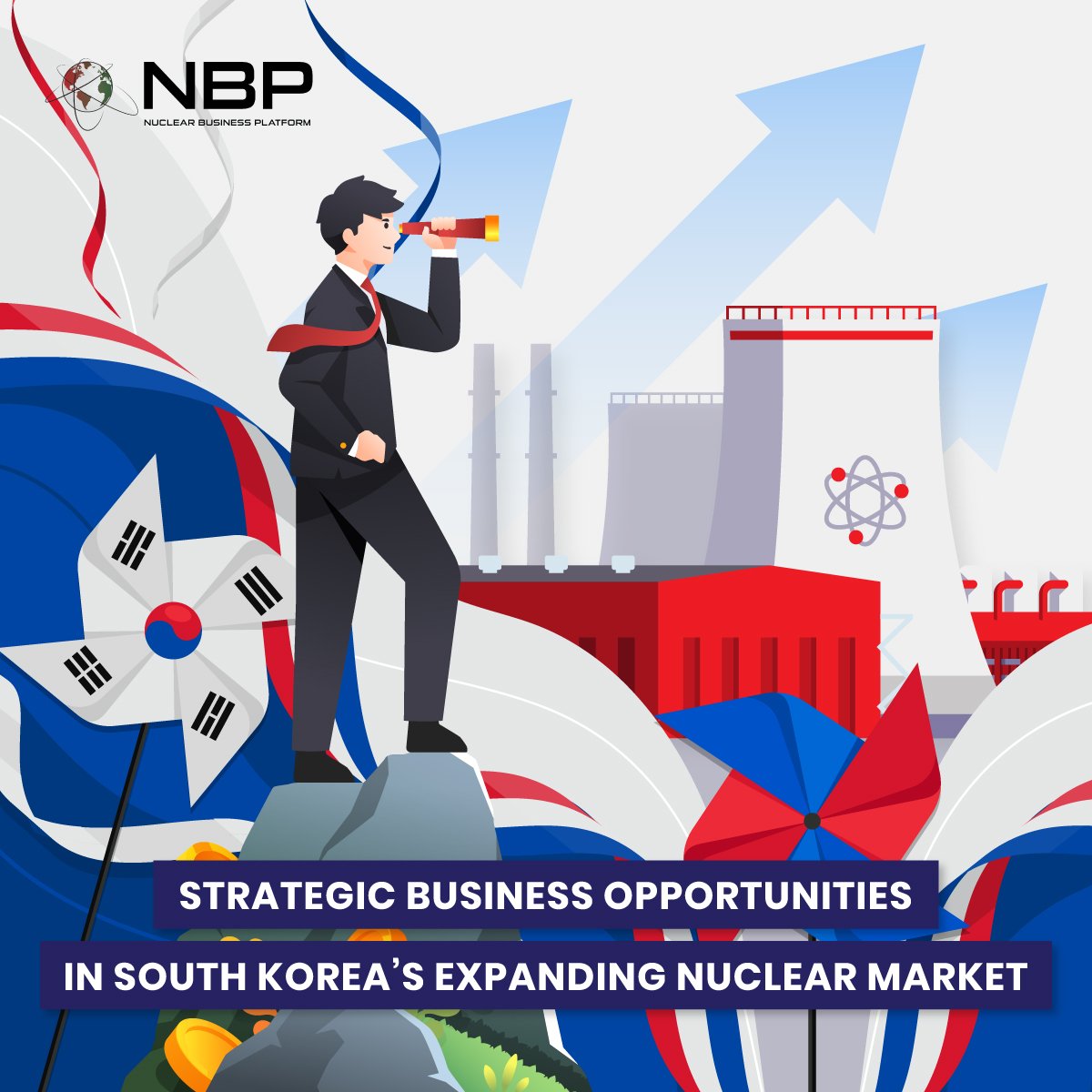Strategic Business Opportunities in South Korea’s Expanding Nuclear Market
South Korea’s nuclear market offers a wealth of opportunities for foreign companies as the country embarks on an expansion of its nuclear capabilities. With plans to secure ten new nuclear power plant orders by 2030, South Korea is strengthening its position as a global leader in nuclear technology. The government has reversed its 2017 shift away from nuclear energy and is now focused on increasing the share of nuclear power from the current 28% to at least 30% by 2030, with a further goal of 34.6% by 2036. This strategic push, combined with South Korea’s cutting-edge reactor designs and expertise, is drawing significant international interest. For foreign nuclear companies, this presents a range of opportunities in areas such as reactor construction, technology development, and fuel supply, as well as partnerships in accessing broader international nuclear markets.
Opportunities in Small Modular Reactors (SMRs)
South Korea is rapidly advancing in the Small Modular Reactor (SMR) market, with the sector expected to grow at a CAGR of 3.1% from 2023 to 2033. The country's strong commitment is reflected in its $305 million government initiative launched in 2023, aimed at developing a domestic SMR by 2028. The formation of an SMR Alliance, consisting of 42 public and private entities, underscores the ambition to establish a leadership role in SMR technology. This provides significant opportunities for international companies to collaborate on research and development (R&D), design, and construction within this space.
Furthermore, the government’s plan to create an SMR industrial hub with a $216 million investment highlights the potential for foreign firms specializing in SMR technology to form strategic partnerships. Companies focused on SMR design, component manufacturing, and advanced safety technologies can explore lucrative ventures in South Korea through joint ventures, technology transfer, and collaborative projects.
Nuclear Fuel Supply Chain Opportunities
As South Korea plans to complete several new reactors, the demand for nuclear fuel, particularly Low-Enriched Uranium (LEU) and High-Assay Low-Enriched Uranium (HALEU), is expected to surge. This demand presents significant opportunities for international nuclear fuel suppliers. The recent agreement between Korea Hydro & Nuclear Power (KHNP) and US nuclear fuel supplier Centrus underscores South Korea’s commitment to diversifying its nuclear fuel supply chain.
Foreign companies involved in fuel enrichment, supply, and the development of next-generation fuels, such as HALEU, are positioned to benefit from long-term contracts. Given HALEU’s critical role in improving efficiency and safety in advanced reactors and SMRs, securing contracts with South Korean firms can offer both stability and growth in this evolving market.
Accessing Other Nuclear Markets via South Korea
Partnering with South Korean firms offers a strategic gateway for foreign companies looking to access broader nuclear markets across Asia and beyond. South Korea has strengthened its domestic nuclear capabilities while becoming a leading exporter of nuclear technology. Key projects, like building the UAE’s first nuclear power plant and securing reactor contracts in the Czech Republic, showcase South Korea's growing global influence. Additionally, collaborations with Brazil, Kenya, and Ukraine further cement its status as a nuclear technology exporter.
Foreign firms that collaborate with companies like KEPCO and KHNP can gain access to emerging markets and the opportunity to co-bid on large-scale projects. This collaboration is mutually beneficial; as it combines South Korea’s proven nuclear expertise with the foreign companies’ potential to expand their market presence.
Joint Ventures with South Korean Nuclear Companies
Forming joint ventures with major South Korean nuclear companies, such as KEPCO, KHNP, and Doosan Heavy Industries, presents substantial growth opportunities for foreign firms. These collaborations provide direct access to South Korea’s advanced nuclear technology ecosystem and allow foreign players to integrate into the supply chain for new reactors, SMRs, and ongoing R&D initiatives.
As South Korea continues to scale its nuclear ambitions, joint ventures in manufacturing, construction, and nuclear plant services will expand. Companies with expertise in nuclear operations, supply chain management, and maintenance services can leverage these partnerships to enhance their global presence.
R&D Collaborations on Advanced Nuclear Technologies
South Korea’s commitment to expanding its nuclear capabilities is backed by significant R&D investments, particularly in next-generation nuclear technologies. Foreign firms can tap into these opportunities by engaging in joint research and development initiatives. South Korean companies are increasingly looking for international expertise to enhance their advancements in areas such as fuel cycle technologies, waste management, and reactor safety.
Collaborating with South Korean research institutes and companies not only enables foreign firms to contribute to cutting-edge nuclear technologies but also positions them for long-term partnerships that can lead to commercial ventures and the deployment of innovative solutions globally.
Why Partner with South Korea?
Foreign nuclear firms are increasingly turning to South Korea for partnerships due to several strategic advantages:
Commitment to Nuclear Safety: South Korea’s Nuclear Safety and Security Commission (NSSC) enforces stringent safety standards, offering a highly secure and reliable environment for nuclear projects.
High Operational Efficiency: South Korean reactors consistently achieve high capacity factors, often exceeding 96.5%, setting a benchmark for reliability and performance.
Cost-Effective Construction: The APR1400 reactor design, known for its competitive construction costs, allows foreign firms to participate in projects with lower capital expenditures and greater efficiency.
Strong Government Support: The South Korean government’s strategic focus on securing new nuclear orders by 2030 is backed by strong policy support, making it an ideal partner for foreign firms seeking long-term stability.
Technological Independence: South Korea has developed a strong domestic nuclear industry, focusing on self-sufficiency and standardization through initiatives like the Korean Standard Nuclear Plant (KSNP) and KSNP+, making it a key global player.
In short, the South Korean nuclear market is brimming with opportunities for foreign companies across the spectrum of nuclear technologies and services. From capitalizing on the growing SMR market to securing long-term nuclear fuel supply agreements and collaborating on R&D, international companies have multiple avenues to engage with South Korea’s nuclear energy sector. By forming strategic alliances and leveraging South Korea’s global nuclear leadership, foreign firms can position themselves for success in the expanding global nuclear market.



